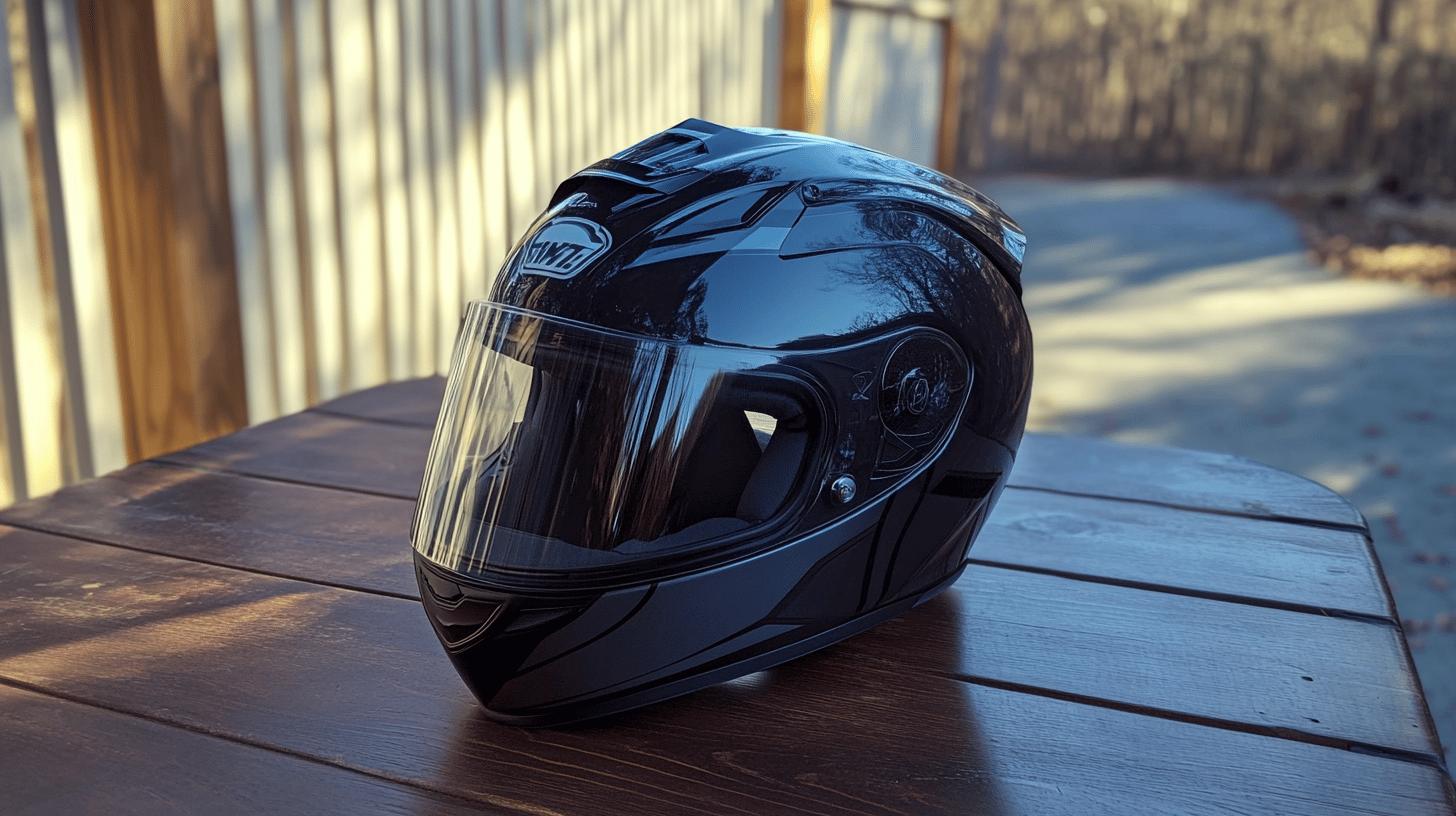Imagine cruising down an open road, wind racing past as you relish the freedom of motorcycle riding. But hanging over every exhilarating ride is a crucial question: do you have to wear a helmet?
This topic often ignites debate among riders who weigh personal freedom against safety regulations. Understanding state-specific helmet laws is vital, as compliance not only affects your safety but also dictates legal and financial consequences.
Discover the intricacies of these laws and why that helmet could be the most important riding gear for protecting both your head and your wallet.
Understanding Motorcycle Helmet Laws by State

Do you have to wear a helmet when riding a motorcycle? The answer is, it depends on the state. In the United States, motorcycle helmet laws differ greatly from one state to another. Some states like Louisiana have stringent regulations requiring all riders, regardless of age, to wear helmets.
This contrasts with states like Kansas, where only riders under the age of 18 are legally required to wear helmets. The varied landscape of helmet laws can be traced back to the 1966 Highway Safety Act, which linked the implementation of helmet mandates to federal safety and highway funds, prompting many states to develop their own regulations.
The penalties for non-compliance with helmet laws vary by state. Riders may face fines, and in some jurisdictions, repeat offenders could see points added to their driving records or even face suspension of their motorcycle license.
Enforcement is not uniform; some states rigorously enforce helmet laws, while others may have more lenient approaches. Regardless, the presence of a law often reflects the state's commitment to rider safety and its recognition of helmets' role in reducing fatalities and injuries.
Traveling across state lines requires motorcyclists to be aware of and comply with helmet regulations of each state they enter. For example, a helmetless ride might be permissible in Kansas for those over 18, but crossing into Missouri without a helmet could lead to infractions, as Missouri's helmet laws are more stringent.
To avoid legal complications and fines, wearing a helmet when traveling through multiple states is advisable, as many states maintain mandatory helmet laws.
| State | Helmet Requirement |
|---|---|
| Louisiana | All riders |
| Kansas | Riders under 18 |
| New Mexico | Age-dependent |
The Safety Benefits of Wearing a Motorcycle Helmet

Do you have to wear a helmet on a motorcycle? The short answer is that while laws vary by state, wearing a helmet is crucial for safety. Helmets play a vital role in significantly reducing the risk of serious injuries and fatalities in motorcycle accidents.
Studies underscore that helmets can lower the risk of head injury by 69% and the risk of death by 42%. These statistics highlight the importance of helmet use as a preventive measure in the event of a crash.
-
Reduces head injury risk by 69%
-
Lowers death risk by 42%
-
Provides protection from environmental hazards
Helmets also serve as a barrier against environmental elements such as wind, rain, debris, and insects, which can impair a rider's ability to focus and react promptly. By offering a layer of protection against these hazards, helmets help maintain a rider's comfort and concentration on the road. This added protection underscores the multifaceted benefits of helmet use beyond just crash scenarios.
The effectiveness of helmets in preventing head injuries cannot be overstated. In motorcycle accidents, the head is particularly vulnerable, and helmets are designed to absorb impact forces, thereby reducing the severity of potential injuries. Helmets are estimated to be 37% effective in preventing fatal injuries to motorcycle drivers. This effectiveness in minimizing head trauma makes helmets an indispensable piece of gear for anyone riding a motorcycle.
Choosing the Right Helmet for Optimal Protection

When selecting a helmet for riding a motorcycle, it is essential to consider safety standards, such as DOT certification. Helmets that meet Department of Transportation (DOT) standards are rigorously tested to ensure they provide adequate protection in the event of an accident.
This certification is a baseline for safety, assuring riders that the helmet can withstand impact and penetration. Other certifications, like ECE (Economic Commission for Europe), signify compliance with international safety standards, offering additional assurance of a helmet's protective capabilities.
Choosing the right helmet involves evaluating several factors to maximize safety and comfort. The helmet's material and build quality play a crucial role in its effectiveness. High-quality materials like polycarbonate, fiberglass, or carbon fiber offer varied levels of protection and weight, impacting how the helmet feels during long rides. The style of the helmet, whether full-face, modular, or open-face, affects both safety and comfort, with full-face helmets generally offering the most protection.
-
Safety certifications (DOT, ECE)
-
Material and build quality
-
Fit and comfort
Ensuring a Proper Helmet Fit
A properly fitted helmet is imperative for optimal safety and comfort. A helmet that fits well should sit snugly on the head without being overly tight, ensuring that it remains securely in place during a ride. It should cover the forehead and not shift when the rider moves their head.
Comfort is also key; pressure points or excessive weight can lead to discomfort and distraction, compromising safety. Helmets should be replaced every five years or sooner if they sustain damage, as wear and tear can degrade their protective capabilities over time.
Debunking Common Myths About Helmet Use

Do you have to wear a helmet on a motorcycle? Some riders believe that helmets are uncomfortable or impede vision, fostering misconceptions about helmet use. These myths often stem from outdated designs or misinformation.
The truth is, helmets are a critical component of rider safety, intended to protect the head during accidents. Additionally, helmets represent a commitment to responsible riding, balancing personal freedom with safety considerations.
-
Helmets obstruct vision: Modern designs ensure clear visibility.
-
Helmets are uncomfortable: Proper fit and design prioritize comfort.
-
Helmets are unnecessary for short rides: Accidents can happen anytime.
Understanding the realities of helmet use helps dispel these myths. Modern helmets are crafted with advanced materials that enhance comfort and ensure a wide field of vision, countering the belief that they are cumbersome.
Helmets are not merely an accessory but a necessity, providing vital protection regardless of the length of the journey. By wearing a helmet, riders uphold safety standards and contribute to a culture of responsible motorcycle riding.
The Legal and Financial Implications of Riding Without a Helmet

Do you have to wear a helmet on a motorcycle? The short answer is yes, if you want to avoid legal penalties. In many states, riding without a helmet can lead to fines, points on your driving record, or even suspension of your motorcycle license.
States like Louisiana enforce helmet laws for all riders, reflecting their commitment to safety. In contrast, Kansas mandates helmets only for riders under 18, but non-compliance can still result in legal repercussions. The variability in enforcement highlights the importance of understanding state-specific laws to avoid unnecessary legal troubles.
Riding without a helmet not only exposes you to legal penalties but also impacts motorcycle insurance premiums. Insurance companies often view helmet use as a sign of responsible riding, which can influence premium calculations.
Not wearing a helmet may lead to increased insurance costs as insurers factor in the heightened risk of injury and the potential for more severe claims. This financial burden underscores the economic advantage of adhering to helmet laws.
Considerations for riders go beyond legal and financial impacts. The risks associated with non-compliance include increased vulnerability to head injuries in an accident. While the immediate consequences of fines and insurance hikes are significant, the potential long-term health implications of riding without a helmet can be far more severe.
By choosing to wear a helmet, riders not only comply with the law but also invest in their safety and financial well-being.
Final Words
Navigating motorcycle helmet laws in the U.S. requires awareness of diverse state regulations and potential penalties. Helmets offer substantial safety benefits, drastically reducing injury risks. Selecting a well-fitted, certified helmet enhances protection on every ride.
Common myths about helmet discomfort and necessity are easily debunked with the right information. Remember, riding without a helmet can result in serious legal, financial, and health consequences. Prioritizing safety through helmet use enriches the overall riding experience.
FAQ
Which states can you ride a motorcycle without a helmet?
In the United States, helmet laws vary by state. Some states allow riding without a helmet, typically with age restrictions. States like Illinois, Iowa, and New Hampshire do not have helmet laws.
Do you have to wear a helmet on a motorcycle in Florida?
In Florida, helmets are not mandatory for riders over 21 if they have medical insurance coverage of at least $10,000.
Do you have to wear a helmet on a motorcycle in California?
California requires all motorcycle riders to wear helmets, irrespective of age or insurance coverage.
What happens if you don't wear a helmet on a motorcycle?
Riding without a helmet can lead to legal penalties, increase injury risk, and result in higher insurance costs. Non-compliance may incur fines and legal consequences.
Is it illegal to ride a motorcycle without a helmet in Texas?
In Texas, helmets are mandatory for riders under 21. Riders over 21 can ride without a helmet if they have completed a safety course or have insurance coverage.
Which states require a motorcycle helmet?
States like California, Louisiana, and New York mandate helmets for all riders. Helmet requirements can be universal or age-dependent, depending on the state.
Can you ride a motorcycle without a helmet in the USA?
In the USA, riding without a helmet is permitted in states without universal helmet laws, often with specific age or insurance conditions.
Do motorcycle riders have to wear a helmet?
Riders must comply with state-specific helmet laws. Some states require helmets for all riders, while others have age or insurance stipulations. Understanding local laws is crucial.

Ryan Thompson is a 35-year-old sport bike enthusiast known for his adventurous spirit. With years of weekend rides and exploring new roads, Ryan brings fresh insights and firsthand experience to ProtectiveGearz. His energetic approach and passion for the latest gear make him a trusted source for riders seeking up-to-date advice.



